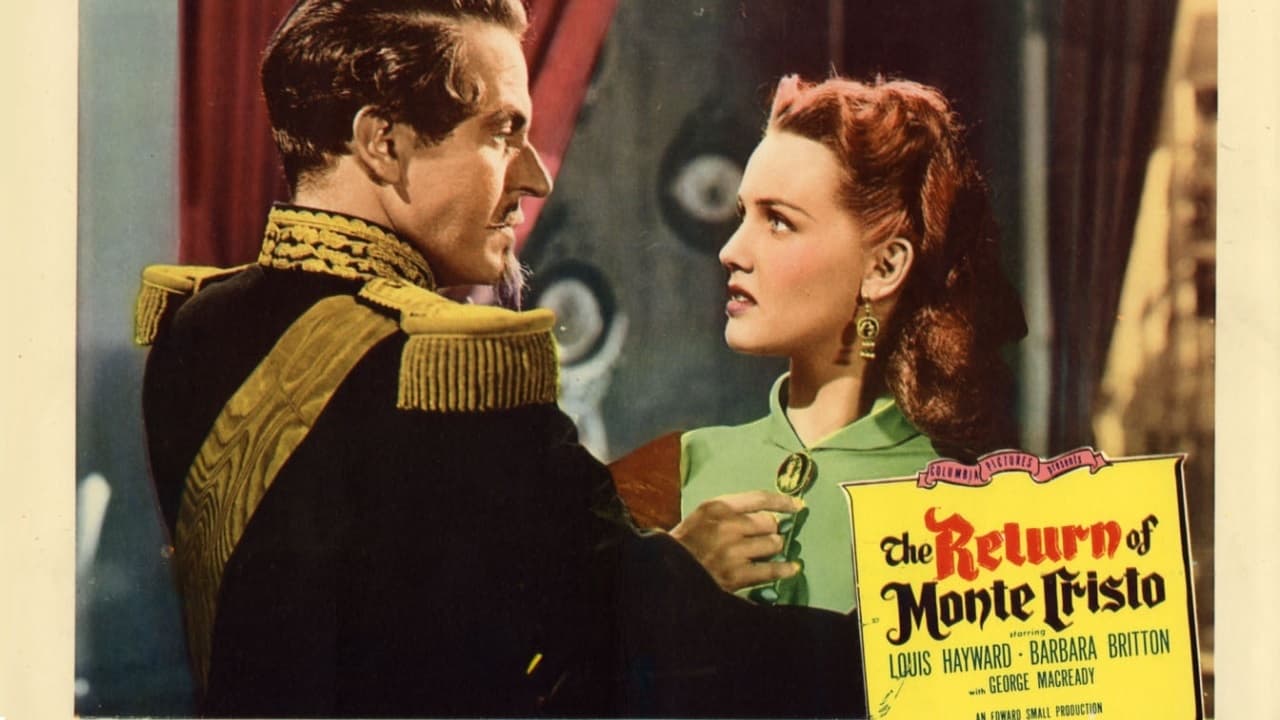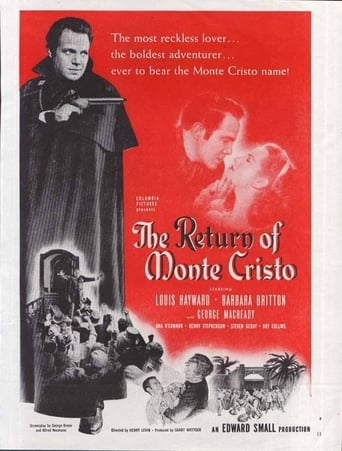



Plot so thin, it passes unnoticed.
Just so...so bad
All of these films share one commonality, that being a kind of emotional center that humanizes a cast of monsters.
View MoreThe thing I enjoyed most about the film is the fact that it doesn't shy away from being a super-sized-cliche;
View MoreLouis Hayward (Edmond) is a relative of the Count of Monte Cristo and the true legal heir to the fortune that comes with this privilege. Some influential conmen send him to jail on false charges and put their replacement Barbara Britton (Angela) forward as the true legal heir to the fortune.I only watched this film yesterday and have forgotten pretty much everything about it. So, it's not particularly good. Louis Hayward isn't really much of a lead for this and there is lots of wearing false disguises in order to get even with the bad guys.Nothing more to say.
View MoreTo begin with, I watched this on the occasion of star Louis Hayward's birthday: being one of the most prolific swashbuckling stars during the genre's Hollywood heyday, I will be including four of his efforts in all during the current Easter marathon. The others are FORTUNES OF CAPTAIN BLOOD (1950) and its sequel, CAPTAIN PIRATE (1952), and the Dick Turpin adventure THE LADY AND THE BANDIT (1951); however, the last remaining of his vehicles in this vein and which – like the movie under review – was inspired by the writings of Alexandre Dumas, i.e. LADY IN THE IRON MASK (1952), seems hard to come by at the moment! With this in mind, THE RETURN OF MONTE CRISTO itself is here accompanied by burnt-in Spanish subtitles!In any case, this is Hayward's own second stab at playing the progeny of "The Count Of Monte Cristo" – the first time in 1940's SON OF MONTE CRISTO (1940); for what it is worth, while ostensibly a sequel, this one is more of an updated reworking of the original! Indeed, as if things were not already clear enough, the protagonist is called Edmond Dantes! Anyway, Hayward plays a physician here who, upon turning 21, is told by his famous ancestor's lawyer Henry Stephenson to be the sole heir of the vast Monte Cristo fortune; however, at the reading of the will, this is contended by another relative (Barbara Britton) and her various eminent patrons (the presiding judge Ludwig Donath – named Jean Lafitte{!}, bank manager and the girl's guardian Ray Collins and Police Chief and Britton's unloved fiancé George Macready). Needless to say, this complication gives rise to a virtual retread of the treachery, incarceration, escape and revenge plot we are all familiar with. That said, the time discrepancy introduces some interesting novelties: instead of the Château d'If, Dantes is taken to Devil's Island (presided over by inevitably brutish overseer Ivan Triesault); the Abbe' Faria figure (here celebrated stage performer and political prisoner Steven Geray) does not die but makes it back with the protagonist and assists him in his elaborate retribution; similarly, rather than being thought dead, Hayward and Geray are believed to be bubonic plague-carriers thanks to the former's botanical/medical expertise!Once back in Paris, he makes full use of his companion's artistic baggage: not only using his theatre to hide in but he adopts several disguises (most amusingly as a hunchbacked but tenacious Jewish detective named "Redbeard"{!}, a bank auditor and – preposterously – Emperor Napoleon III!) to right the wrong done him. In a nice twist, the faint-hearted judge dies – ostensibly infected by the 'disease' Hayward gave himself – in the old Château d'If; Collins' come-uppance occurs when Geray casually mentions that he is bankrupt in a crowded town square – so that his clients flood to withdraw their savings while violently turning on him (conveniently while Dantes is checking the books); Macready's, too, is the stuff of melodrama – a full confession in what appears to be the deserted theatre stage, only for the lights to go up soon after revealing an audience of irate private citizens, to whom the villain is passed so as to receive his just desserts as if he were Dr. Moreau or some such human monster! Of course, the initial misunderstanding between the male and female leads (not helped by an underused Una O'Connor's declamations as Britton's grumpy maid) is well smoothed over by the end...so that Britton does not even have to relinquish her title of "The Countess Of Monte Cristo" (for the record, three films were made bearing the latter title alone, but none seem to have much at all to do with Dantes or Dumas!).Despite the far-fetched narrative embellishments described above, the film is a most enjoyable and good-looking costumer (since there is no swordplay involved, I have refrained from calling it a swashbuckler), unassumingly yet zestfully handled by all concerned (most of whom are quite practiced at this sort of thing). Incidentally, I have a number of other Monte Cristo-related stuff to go through – including at least three direct adaptations of the source material (dating from 1922 {U.S.}, 1929 {France} and 1966 {Italian TV mini-series}) and as many variations, namely MASK OF THE AVENGER and THE SWORD OF MONTE CRISTO (both 1951) and THE TREASURE OF MONTE CRISTO (1961; also known as THE SECRET OF MONTE CRISTO, since there was already a 1949 noir by the film's original moniker!).
View MoreEdmond Dantes, grand nephew of the original Count of Monte Cristo, is set to receive his ancestor's wealth. When Dantes arrives in Marsaille to collect the inheritance, he is arrested as an impostor by Judge Lafitte, de la Roche, and Blanchard, who have forged the original will so that Blanchard's daughter Angela will get the inheritance, and eventually de la Roche will marry Angela to control the money which can offset Blanchard's embezzling from the national bank. Dantes is jailed and sent to Devil's Island to rot, but manages to escape with Bombelles (an actor). Arriving back in France, Dantes seeks revenge on the 3 adversaries and uses a variety of disguises and means to trap each conspirator one by one, but has to act fast before de la Roche can send the police force on Dantes and marry Angela to complete his plan. This is not a swashbuckler like Hayward's other venture in the Dumas, Son of Monte Cristo, but this film is more plot than action driven and does use the revenge element like the original Count of Monte Cristo. Hayward is excellent in the role having fun with all of the characterizations of Dantes, as well as a hunchbacked detective, bank examiner, & Napoleon III. Britton looks beautiful and her acting chops are a bit naive here, but she carries herself well. Geray is fun as Bombelles, and MacReady once again oozes out the evilness that is his trademark. I think there could have been at least one swordfight, but the pace of the film is not certainly off where we need some action. Rating, 8.
View More